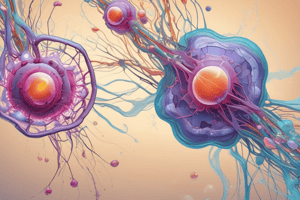Podcast
Questions and Answers
What is the main focus of cell biology?
What is the main focus of cell biology?
- The study of life and living organisms
- The study of genetics and biochemistry
- The study of ecology and organism distribution
- The study of the structure, function, and behavior of cells (correct)
Which type of cells do not have a nucleus or other membrane-bound organelles?
Which type of cells do not have a nucleus or other membrane-bound organelles?
- Eukaryotic cells
- Prokaryotic cells (correct)
- Animal cells
- Fungal cells
What are the two main types of cells based on their structure?
What are the two main types of cells based on their structure?
- Animal and plant cells
- Stem and differentiated cells
- Mitochondrial and chloroplast cells
- Prokaryotic and eukaryotic cells (correct)
What are the techniques used by cell biologists to understand how cells function?
What are the techniques used by cell biologists to understand how cells function?
What is the main focus of cell biologists in studying the organization of cellular components?
What is the main focus of cell biologists in studying the organization of cellular components?
Which process involves the distribution of chromosomes between daughter cells?
Which process involves the distribution of chromosomes between daughter cells?
What is a key application of cell biology in the field of medicine?
What is a key application of cell biology in the field of medicine?
What is a notable contribution of cell biologists to addressing health and environmental challenges?
What is a notable contribution of cell biologists to addressing health and environmental challenges?
In which area do cells communicate with each other through various mechanisms such as chemical signals?
In which area do cells communicate with each other through various mechanisms such as chemical signals?
What is an essential aspect for understanding how cells work together in multicellular organisms?
What is an essential aspect for understanding how cells work together in multicellular organisms?
Flashcards are hidden until you start studying
Study Notes
Biology: The Study of Life
Biology is the scientific discipline that studies life and living organisms, their structure, function, behavior, origin, and distribution. It encompasses a vast range of subfields, including cell biology, genetics, ecology, and biochemistry, among others. In this article, we will focus on cell biology, which is the study of the structure, function, and behavior of cells, the basic unit of life.
Cell Biology: The Building Blocks of Life
Cell biology is a branch of biology that focuses on the study of cells, which are the basic building blocks of all living organisms. There are two main types of cells:
- Prokaryotic cells: Found in bacteria and archaea, these cells do not have a nucleus or other membrane-bound organelles.
- Eukaryotic cells: Found in plants, fungi, animals, and protists, these cells have a nucleus and other membrane-bound organelles.
Cells are complex and dynamic structures that carry out a wide range of functions, including growth, reproduction, and response to the environment. To understand how cells function, cell biologists use a variety of techniques, including microscopy, biochemistry, and genetics.
Key Concepts in Cell Biology
Several key concepts are central to the study of cell biology:
-
Cell structure: The structure of a cell is crucial to its function. Cell biologists study the organization of cellular components, such as the cytoskeleton, which provides structural support and helps move materials within the cell.
-
Cell function: Cell biologists investigate how cells carry out their functions, such as metabolism, which involves the processing of nutrients, and endocytosis, which is the process by which cells take in substances from their environment.
-
Cell division: The process by which cells reproduce and divide is another important area of study in cell biology. This includes the stages of mitosis, when the chromosomes are separated and distributed between the two daughter cells, and cytokinesis, when the cytoplasm is divided.
-
Cellular communication: Cells communicate with each other through various mechanisms, such as chemical signals and the exchange of cellular components. Understanding these communication pathways is essential for understanding how cells work together in multicellular organisms.
Applications of Cell Biology
The study of cell biology has numerous applications in fields such as medicine, biotechnology, and agriculture. For example, cell biologists have contributed to the development of new treatments for diseases, such as cancer, by understanding how cells divide and grow. In addition, advances in cell biology have led to the development of new technologies, such as gene therapy and genetic engineering, which hold promise for addressing a wide range of health and environmental challenges.
In conclusion, cell biology is a fascinating and dynamic field of study that provides fundamental insights into the structure, function, and behavior of cells. By understanding these basic units of life, we can better appreciate the complexity and diversity of life on Earth and harness this knowledge to address some of the most pressing challenges facing our world today.
Studying That Suits You
Use AI to generate personalized quizzes and flashcards to suit your learning preferences.




